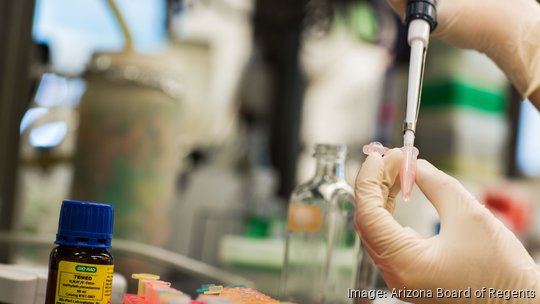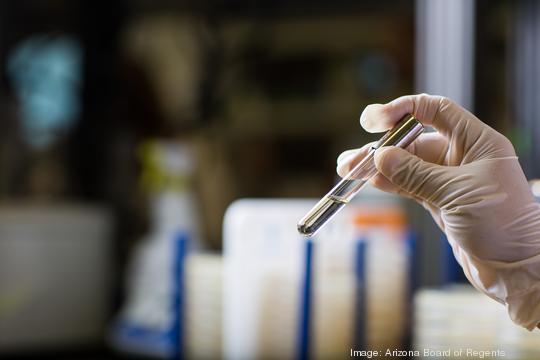
Arizona State University and the University of Arizona spun out more startups and issued more patents in 2020 than they did in 2019 — with the potential to contribute millions of dollars to the state's economy.
The two state universities spun out 38 startups in fiscal 2020, up from 29 in fiscal 2019. They also issued 222 patents in fiscal 2020, up from 185 in fiscal 2019.
Doug Hockstad, assistant vice president of Tech Launch Arizona at University of Arizona, said the Tucson-based university launched a record number of startups in fiscal 2020, despite the pandemic.
"We expect to continue to launch approximately 15 each year, with our Venture Development group working hard to fully prepare teams to move out into the business world and begin raising money," Hockstad said. "Innovation doesn't rest at the University of Arizona, and our investment in intellectual property has not waivered."
ASU garners national ranking
ASU is among the leaders in the nation in patents granted and startups launched among schools without a medical school, according to the latest rankings by the Association of University Technology Managers. University of Arizona, meanwhile, has two medical campuses — one at its main campus in Tucson and one in downtown Phoenix on the Phoenix Biomedical Campus.
According to AUTM's latest nationwide survey — based on fiscal 2019 results — ASU was fourth in patents granted, fourth in startups launched and third in inventions disclosed when compared to other universities without a medical school.
Northern Arizona University, the third public university, spun out one company in fiscal 2020, but didn't have any startups in fiscal 2019.
Click on the gallery to see how each of the three state universities fared in their technology transfer programs.
Tech transfer
"ASU researchers are tackling some of the world's biggest challenges, from sustainable resources and carbon capture to cancer detection and treatment," said Augie Cheng, CEO and chief legal officer for Skysong Innovations, the tech transfer group for ASU. "Skysong Innovations identifies those technologies with broad commercial potential and coordinates with the right partners to bring these innovations into the marketplace."
ASU spinouts created $718 million in gross state product, $478 million in cumulative labor income and $64 million in state and local tax revenue between 2016 and 2020, according to an economic impact study conducted by ASU's L. William Seidman Research Institute.
By 2025, Seidman projects the Arizona impact of Skysong Innovations and these ASU-linked companies to approach $1.6 billion, and the nationwide economic impact will exceed $2.3 billion.
"This is not ASU at large, nor is it the Skysong presence in south Scottsdale," said Kyle Siegal, senior vice president and chief patent counsel. "This is just through the venture activities of our office of 15 people. These are the startups we helped launch and what they do for the state of Arizona."
ASU spinout tracks coronavirus
One of the 19 startups spinning out of ASU in 2020 was AquaVitas.
Rolf Halden, an ASU professor and director of the Center for Environmental Health Engineering at ASU's Biodesign Institute and an AquaVitas co-founder, has developed several patented and patent-pending technologies to monitor toxins in groundwater and to determine the best way of removing them from drinking water resources by using naturally occurring microorganisms.

Halden teamed up with two of his former students — Adam Gushgari, who is serving as CEO, and Erin Driver — to start AquaVitas in May 2019, studying wastewater and its impact on public health.
At first, there weren't many people interested in their research until the coronavirus pandemic hit and talk began to surface about using wastewater to track the virus.
"I've been in science for 30 years and I have never seen a scientific discipline rapidly emerging out of obscurity," Halden said.
Because AquaVitas had been in place since May 2019, it was positioned to use its technology to find clusters of infections.
"We conducted the largest wastewater-based epidemiological study ever performed in the U.S. at the beginning of this year," he said.
The technology can be used to track any type of disease in wastewater.
"It can be applied to just about anything that can be measured in urine or stool," he said. "When the U.S. Department of Health and Human Services called for a bid, our startup got the nod to perform this work."
Customers now include Fortune 500 companies to universities to municipalities, including the city of Tempe that uses AquaVita's technology to track the spread of coronavirus on its Covid-19 wastewater results dashboard.
While he wouldn't disclose annual revenue, Halden said AquaVitas didn't quite break six figures in 2020.
"We are making seven-figure revenue in the first quarter of 2021," he said. 'We are exponentially scaling the operation."





















